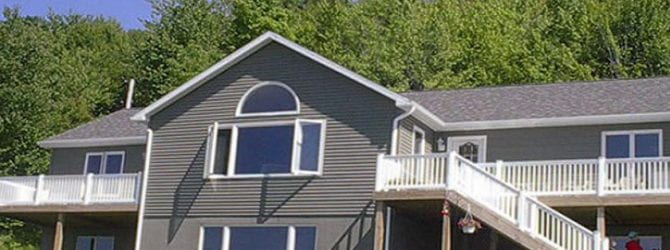Home is often your most valuable investment. Cornell Cooperative Extension’s housing programs can help:
- Identify environmental risks, concerns or problems in and around your home or apartment.
- Make simple changes in household practice to care for your home and its furnishings, prevent pollution and help reduce consumption of water, energy and other resources.
- Take preventive actions to safeguard your home health and the environment.
- Learn new building technology, energy-wise products, and housing improvements.
Home-A-Syst
Home*A*Syst is a confidential self-assessment program you can use to evaluate your home and property for pollution and health risks. Home*A*Syst explains what risks to look for and describes safe practices for reducing and eliminating risks. Resources and selected topics included in Home*A*Syst include:
- Household Wastewater
- Storm Water Management
- Household Hazardous Products
- Lead In and Around the Home
- Indoor Air Quality
- Heating and Cooling Systems
- Managing Household Waste: Reusing, Recycling and
- Composting
Healthy Homes for America
Did you know most people spend a least half their lives inside their homes? Unfortunately, indoor air can be more harmful to your family’s health than outdoor air. Take care to ensure you have a healthy home by knowing about these common problems that can occur in your home:
Mold & Mildew
Moisture control will help prevent mold and mildew problems in the home.
Biological Contaminants
Effective house-cleaning can control biological contaminants/allergen triggers that can cause asthma. Pets, tobacco smoke, dust mites, cockroaches and insects and pollute the air and make asthma worse.
Lead
Lead is a serious health risk for children and pregnant women. You can take steps to decrease risk:
Asbestos
Many products used to build and furnish your home can make indoor air unhealthy. Learn more:
Be Energy Smart
The New York State Energy Research and Development Authority (NYSERDA) is participating in the ENERGY STAR® Change a Light, Change the World Campaign. The goal of the campaign is to save energy and reduce greenhouse gas emissions by encouraging consumers to switch to ENERGY STAR qualified lighting products such as compact fluorescent light bulbs (CFLs). These transactions are tracked by a pledge, completed by the consumer, stating that the change has been made. Questions on becoming a pledge driver, call 1-877-NY-SMART or send an email to residential@nyserda.org
Water Quality Information
Water quality information is available from our office for home owners interested in water testing, water treatment, water conservation, private water systems, household chemicals and your septic system, bottled water, or water during emergencies? You can also review resources on our Emergencies page.
Radon
During the winter months Delaware County homeowners should test their homes for Radon. Radon is a gas that comes from the breakdown of uranium in soil, rock and water. It occurs naturally in the earth, but can become a problem when it builds up indoors. Radon is the second leading cause of lung cancer. Homeowners can take steps to lower or mitigate an elevated radon level.
The radon program provides information on health risks from radon, testing for radon and mitigation of elevated levels of radon. Low cost test kits are available for citizens of New York State. Here are some resources to get started:
- Radon Basic Facts & Dispelling Common Myths
- Radon Resources ~ Department of Health
- Radon test kits and free post-mitigation testing kit from NYS Dept of Health – Free Radon In Air Testing for New York State residents who have had a radon mitigation system installed within a year. Note – Name and address of the mitigation contractor is required to qualify for the program.
For more information contact
Valerie Dudley, Administrative Assistant, vsd22@cornell.edu
(607) 865-6531


